As the new year approaches, I can’t help thinking how it’s been an awful year in Israel and Gaza and now Lebanon, and scary in our domestic politics. I sympathize with all the rabbis who want to give sermons that are hopeful. I’m trying to be hopeful, and if it’s any help, the news this month about interfaith family inclusion has been quite positive.
Very Welcome News: New 18Doors Program to Increase Belonging
18Doors and the Jewish Federation of Greater Houston announced the launch of B’Yachad, a program aimed at helping Jewish organizations increase feelings of belonging among interfaith couples and families. Four synagogues, a day school and the federation are participating. B’Yachad programs are set to follow in Atlanta and Chicago. Rabbi Scott Hausman-Weiss, an 18Doors Board member, said “a community-wide discussion and energy on this subject is desperately needed to develop best practices toward strengthening these families and, in so doing, our Jewish community.”
What Doug Emhoff and the HUC Admissions Decision Say About Attitudes Towards Interfaith Marriage
Emily Tamkin wrote a great story for Ha’aretz, “For American Jews in Intermarriage Partnerships, Doug Emhoff Has Become an Inspiration.” She notes:
For many American Jews in interfaith partnerships, Emhoff’s embrace of his identity and his way of speaking about his partnership [including at the Democratic National Convention] … has meant representation for something they take both as a given and find questioned by others – especially other Jews.
18 Doors’ Adam Pollock agrees that prominent representation for interfaith families can be very validating to them. (Coincidentally, Jonathan Tobin, who is no friend of interfaith marriage, questioned whether Doug Emhoff is a Jewish role model, but was surprisingly not very critical of the fact that Emhoff intermarried.)
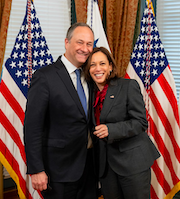 Tamkin quotes Rabbi Lex Rofeberg as saying that HUC’s decision to admit rabbinic students in interfaith relationships was “a bigger deal” than Emhoff’s convention speech, because it counters the way interfaith relationships are besieged or attacked in Jewish spaces. Andrew Rehfeld is then quoted as saying that the new policy is recognition of a shift in American Jewish life with many interfaith families deeply engaged. He makes the point, echoed by the USCJ’s Keren McGinity, that partners from different faith backgrounds can result in deeper commitments from their Jewish partners.
Tamkin quotes Rabbi Lex Rofeberg as saying that HUC’s decision to admit rabbinic students in interfaith relationships was “a bigger deal” than Emhoff’s convention speech, because it counters the way interfaith relationships are besieged or attacked in Jewish spaces. Andrew Rehfeld is then quoted as saying that the new policy is recognition of a shift in American Jewish life with many interfaith families deeply engaged. He makes the point, echoed by the USCJ’s Keren McGinity, that partners from different faith backgrounds can result in deeper commitments from their Jewish partners.
Separately, Rabbis Robyn Frisch and Miriam Wajnberg of 18Doors wrote a nice explanation of how the HUC decision affects five different groups – not just prospective applicants or current students, but also congregants, those who grew up in an interfaith family, really everyone in the Jewish community.
They mention one issue which I think is still a sticking point:
And if you’re not Jewish, but your partner is, then you’ll also hopefully come to see that while there may be limits to your ritual participation in given communities, your relationship is not “less than.” The Jewish community values your partner, you and your relationship – without trying to change you. As a couple, you’re not just “welcome” in Jewish spaces; you also “belong” in Jewish spaces.
There certainly are communities where there are limits to ritual participation by those who are not Jewish. I think that makes it very difficult for interfaith couples and partners from different faith backgrounds to not feel “less than” or that they “belong.” Allowing full ritual participation to partners from different faith backgrounds doesn’t mean changing them – it doesn’t make them Jewish; instead, it prioritizes and maximizes not Jewish identity, but Jewish engagement.
More Good News: Bravo Jewish Future Promise
 Hadara Ishak, president of the Jewish Future Promise, wrote an important post on the Times of Israel blog, with the sub-title “Building a Bigger Tent for the Jewish Community.” The Jewish Future Promise, founded by my friend Mike Leven, is a wonderful organization that asks for a moral commitment that at least 50% of charitable contributions made upon passing will be allocated to Jewish causes and/or the State of Israel.
Hadara Ishak, president of the Jewish Future Promise, wrote an important post on the Times of Israel blog, with the sub-title “Building a Bigger Tent for the Jewish Community.” The Jewish Future Promise, founded by my friend Mike Leven, is a wonderful organization that asks for a moral commitment that at least 50% of charitable contributions made upon passing will be allocated to Jewish causes and/or the State of Israel.
So I was incredibly pleased to see the president of such a mainstream organization with such an eminent Advisory Board say:
[E]mbracing a broader definition of Jewish identity and fostering interfaith dialogue, we can stand united and build a stronger, more resilient Jewish future. The inclusion of interfaith families and their diverse experiences will only enhance our collective strength, enabling us to speak with a singular, powerful voice in support of Israel and Jewish values worldwide.
Another very welcome sign of positive change in attitudes.
Is “Nobody Wants This” Net Positive? Not Sure Yet
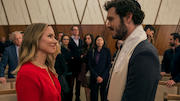 The just released Netflix series, “Nobody Wants This,” about a “hot” rabbi played by Adam Brody, dating a woman who’s not Jewish played by Kristen Bell, is getting a lot of attention. Benyamin Cohen wrote a nice story for the Forward that featured two intermarried rabbis, Lex Rofeberg and Denise Handlarski. Mira Fox wrote a more critical review, which I can’t respond to fully because I haven’t seem the entire series yet. She suggests that the rabbi in choosing love for a woman not Jewish is giving up his “entire identity and value system” – if that’s the show’s message, I’m not going to like it.
The just released Netflix series, “Nobody Wants This,” about a “hot” rabbi played by Adam Brody, dating a woman who’s not Jewish played by Kristen Bell, is getting a lot of attention. Benyamin Cohen wrote a nice story for the Forward that featured two intermarried rabbis, Lex Rofeberg and Denise Handlarski. Mira Fox wrote a more critical review, which I can’t respond to fully because I haven’t seem the entire series yet. She suggests that the rabbi in choosing love for a woman not Jewish is giving up his “entire identity and value system” – if that’s the show’s message, I’m not going to like it.
18Doors’ Miriam Wajnberg offers “A Rabbi’s Review of the First Three Episodes” and it’s the best I’ve seen so far, listing the delightful moments and the cringe-worthy ones. Another interesting review concludes “delightful despite flaws.”
JTA’s story by Shira Li Bartov, “How a real-life rabbi coached Netflix’s ‘Nobody Wants This’ about making interfaith relationships realistic,” points out that the show comes at a time when Jewish institutions are increasingly accepting intermarried rabbis, pointing to the HUC decision among others. She adds that the stereotypes of Jewish women in the show overbearingly objecting to the “shiksa” (a word I hate) runs counter to that trend of acceptance.
Kveller has a story about whether the word “shiksa” is offensive. Hey Alma has a story that fact-checks the accuracy of “the Judaism” in all ten episodes of the show. The show’s creator, Erin Foster, is the subject of a long piece, “Erin Foster brings her conversion story to the forefront in ‘Nobody Wants This’.”
Also in the News
- An awful piece in the Cleveland Jewish News by someone who’s been described as an “Israeli ultranationalist” who tells parents not to send Jewish children to Ivy League schools because they’ll intermarry, risking the future of Jewish identity in America. I hate the way anti-interfaith marriage views seep into a mainstream Jewish publication — another example why ongoing advocacy for more positive attitudes about interfaith marriage is needed.
- On the other hand, times certainly are changing. This obscure mention caught my eye in a piece describing the history of the Kansas City Jewish Chronicle: “during the turbulence of the late 1960s … [t]here was also a big debate about whether interfaith marriage announcements should be printed in a Jewish publication.”
- And I was pleased to see, in a September 16 email solicitation for a contribution from the Conservative movement, that Rabbi Jacob Blumenthal included, as one of five examples of what gifts supported, that the movement “developed new interfaith bylaws and resources to help congregations create a true sense of belonging for all.”
* * * * *
Best wishes for a better, hopeful, and healthy new year.

 We’ve expressed before the hope that “peoplehood” will be understood to include partners from different faith backgrounds, as well as their families. Our group under threat needs to be as broad as possible, with as many allies as possible.
We’ve expressed before the hope that “peoplehood” will be understood to include partners from different faith backgrounds, as well as their families. Our group under threat needs to be as broad as possible, with as many allies as possible. This article in the New York Times, “
This article in the New York Times, “ Last month we
Last month we 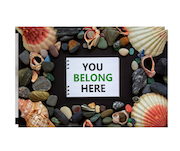 “
“ The UK Institute of Jewish Policy Research issued a new
The UK Institute of Jewish Policy Research issued a new  The Center is proud to have signed up to be a distribution
The Center is proud to have signed up to be a distribution 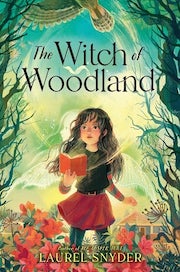 Laurel Snyder, an award-winning author of children’s books who grew up with a Jewish father and a Catholic mother, wrote a beautiful
Laurel Snyder, an award-winning author of children’s books who grew up with a Jewish father and a Catholic mother, wrote a beautiful 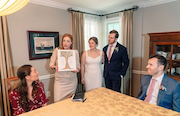 Coincidentally, JTA had an earlier interesting
Coincidentally, JTA had an earlier interesting  More stories are starting to appear about the impact on people in interfaith relationships of Israel’s war against Hamas and increasing expressions of antisemitism. In “
More stories are starting to appear about the impact on people in interfaith relationships of Israel’s war against Hamas and increasing expressions of antisemitism. In “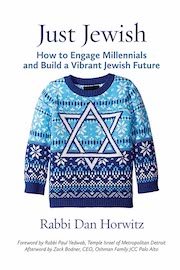 What we appreciated about the book is the matter-of-fact acknowledgment of the prevalence of interfaith relationships and seeing them as an opportunity. This starts with the Introduction: “Jewish Millennials are globally connected, have mostly non-Jewish friends, and are living in interfaith households at an incredibly high clip (whether as products of an interfaith marriage and/or in one themselves).” Or the book’s end, “For those concerned about Jewish continuity, the math argues for viewing interfaith marriages as a Jewish communal growth opportunity.”
What we appreciated about the book is the matter-of-fact acknowledgment of the prevalence of interfaith relationships and seeing them as an opportunity. This starts with the Introduction: “Jewish Millennials are globally connected, have mostly non-Jewish friends, and are living in interfaith households at an incredibly high clip (whether as products of an interfaith marriage and/or in one themselves).” Or the book’s end, “For those concerned about Jewish continuity, the math argues for viewing interfaith marriages as a Jewish communal growth opportunity.” I was very disappointed in the Kol Nidre sermon of Angela Buchdahl, senior rabbi at Central Synagogue in Manhattan, which you can listen to
I was very disappointed in the Kol Nidre sermon of Angela Buchdahl, senior rabbi at Central Synagogue in Manhattan, which you can listen to  Just before Yom Kippur, Religion News Service ran “
Just before Yom Kippur, Religion News Service ran “ “
“ Amy Beth Starr, whose husband is not Jewish, wrote very poignantly for
Amy Beth Starr, whose husband is not Jewish, wrote very poignantly for  eJewishPhilanthropy
eJewishPhilanthropy  Dr. Staetsky says that “the definition of Jewishness dictated by Jewish law… is broadly accepted by all Jews, while the modifications to it, or expansions, are not.” That’s the root of the problem – the traditional perspective doesn’t tolerate inclusion of interfaith couples or their children. It views high rates of interfaith marriage as a problem, a failure. Comparing the rate of all married Jews who are intermarried, the IJPR study finds the US in the middle of the pack at 45%, compared to Israel at 5% and Poland at 76%; a self-congratulatory
Dr. Staetsky says that “the definition of Jewishness dictated by Jewish law… is broadly accepted by all Jews, while the modifications to it, or expansions, are not.” That’s the root of the problem – the traditional perspective doesn’t tolerate inclusion of interfaith couples or their children. It views high rates of interfaith marriage as a problem, a failure. Comparing the rate of all married Jews who are intermarried, the IJPR study finds the US in the middle of the pack at 45%, compared to Israel at 5% and Poland at 76%; a self-congratulatory  More evidence of the persistence of traditional attitudes is
More evidence of the persistence of traditional attitudes is  Sandy pointed me to new text on the Global Jewry website: “We believe in inclusivity and embrace Jews of all backgrounds, affiliations, and levels of observance. Whether you’re Orthodox, Conservative, Reconstructionist, Reform, Just Jewish, exploring your Jewish identity or supporting your Jewish partner, you’ll find a warm and accepting space here.”
Sandy pointed me to new text on the Global Jewry website: “We believe in inclusivity and embrace Jews of all backgrounds, affiliations, and levels of observance. Whether you’re Orthodox, Conservative, Reconstructionist, Reform, Just Jewish, exploring your Jewish identity or supporting your Jewish partner, you’ll find a warm and accepting space here.” I liked a
I liked a